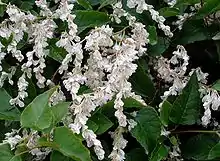Fallopia baldschuanica
Fallopia baldschuanica (syn. Polygonum baldschuanicum) is an Asian species of flowering plant in the knotweed family known by several common names, including Russian-vine,[5] Bukhara fleeceflower,[6] Chinese fleecevine, mile-a-minute and silver lace vine. It is native to Asia (China, Russia, Kazakhstan, etc.),[7] and is growing wild in parts of Europe and North and Central America as an introduced species.[3][8][7]
| Fallopia baldschuanica | |
|---|---|
 | |
| Scientific classification | |
| Kingdom: | Plantae |
| Clade: | Tracheophytes |
| Clade: | Angiosperms |
| Clade: | Eudicots |
| Order: | Caryophyllales |
| Family: | Polygonaceae |
| Genus: | Fallopia |
| Species: | F. baldschuanica |
| Binomial name | |
| Fallopia baldschuanica | |
| Synonyms[1][2][3][4] | |
|
Synonymy
| |
Some authors split the species in two, referring to the Chinese populations as Fallopia aubertii and the Russian and Central Asian species as F. baldschuanica.[7]
Fallopia baldschuanica is grown as an ornamental plant for its flower-laced vines. The white flowers are decorative and provide nectar and pollen for the honey bee.[3][7] As it is fast-growing, it is used as cover for unsightly fences and other garden structures. It can become invasive, however.
Description
Fallopia baldschuanica is a vining plant with woody, climbing stems at least 10 metres (33 ft) in length. The pointed oval or nearly triangular leaves are up to 10 centimetres (4 in) long and borne on petioles. The inflorescence is an open array of narrow, branching, drooping or spreading clusters of white flowers, each cluster reaching a maximum of 15 centimetres (6 in) long. Flowers hang on short pedicels. Each five-lobed flower is just under a centimeter long and white to greenish or pale pink, sometimes turning bright pink as the fruit develops. The fruit is a shiny black achene about 2 millimetres (5⁄64 in) wide.[3]
In culture
It features in Nemesis, by Agatha Christie. in the story, the greenhouse at the Old Manor House of the three sisters collapsed. The sisters planted this creeper to cover what they could not restore. Miss Marple names the plant upon seeing it about to bloom, under its former name of Polygonum baldschuanicum. It is also the title of Chapter 9, and represents a theme in the novel.[9]
See also
References
- Tropicos, Fallopia baldschuanica (Regel) Holub
- "Fallopia baldschuanica (Regel) Holub". Royal Botanic Gardens, Kew and Missouri Botanic Garden. 2013.
- Flora of North America, Fallopia baldschuanica (Regel) Holub, 1971. Bukhara fleeceflower, mile-a-minute vine
- Tropicos, Fallopia aubertii (L. Henry) Holub
- BSBI List 2007 (xls). Botanical Society of Britain and Ireland. Archived from the original (xls) on 2015-06-26. Retrieved 2014-10-17.
- USDA, NRCS (n.d.). "Polygonum baldschuanicum". The PLANTS Database (plants.usda.gov). Greensboro, North Carolina: National Plant Data Team. Retrieved 19 January 2016.
- Flora of China, Fallopia aubertii (L. Henry) Holub, 1971. 木藤首乌 mu teng shou wu
- Altervista Flora Italiana, Fallopia baldschuanica (Regel) Holub
- Christie, Agatha (2013) [1971]. "9". Nemesis. Harper Audio. ISBN 978-0062265821.
External links
- Jepson Manual Treatment, University of California
- Kemper Center for Home Gardening, Missouri Botanical Garden